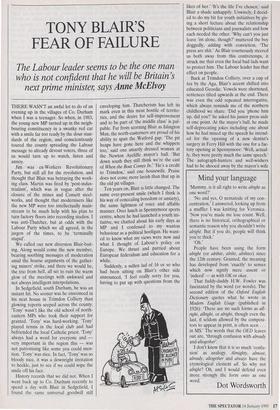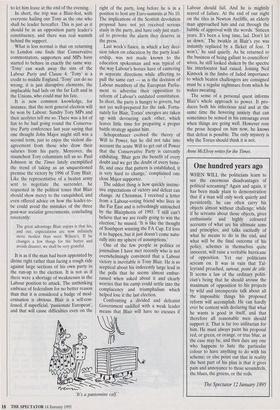TONY BLAIR'S FEAR OF FAILURE
The Labour leader seems to be the one man who is not confident that he will be Britain's
next prime minister, says Anne McElvoy
THERE WASN'T an awful lot to do of an evening up in the villages of Co. Durham when I was a teenager. So when, in 1983, the young new MP turned up in the neigh- bouring constituency in a swanky red car with a smile far too ready by the dour stan- dards of the region, and conscientiously toured the county spreading the Labour message to already devout voters, three of us would turn up to watch, listen and annoy.
Jim was ex-Workers Revolutionary Party, but still all for the revolution, and thought that Blair was betraying the work- ing class. Martin was fired by 'post-indus- trialism', which was in vogue after the closure of the mines and Consett steel- works, and thought that modernisers like the new MP were too intellectually main- stream to be much help with his plan to turn factory floors into recording studios. I was anti-Thatcher, but at odds with the Labour Party which we all agreed, in the jargon of the times, to be 'terminally stupid'.
We called our new diversion Blair-bait- ing. Along would come the new member, bearing soothing messages of moderation amid the hoarse arguments of the gather- ing miners' strike, and there we would be, the trio from hell, all set to ruin the warm glow of the meetings with awkward and not always intelligent interpolations.
In Sedgefield, south Durham, he was an instant hit. No sooner was he ensconced in his neat house in Trimdon Colliery than glowing reports seeped across the county. `Tony' wasn't like the old school of north- eastern MPs who took their support for granted. 'Tony' was hard-working. 'Tony' played tennis in the local club and had befriended the local Catholic priest. `Tony' always had a word for everyone and very important in the region this — was not patronising like some you could men- tion. 'Tony was nice. In fact, `Tony' was so bloody nice, it was a downright invitation to heckle, just to sec if we could wipe the smile off his face.
History records that we did not. When I went back up to Co. Durham recently to spend a day with Blair in Sedgefield, I found the same universal goodwill still
enveloping him. Thatcherism has left its mark even in this most hostile of territo- ries, and the desire for self-improvement and to be part of `the middle class' is pal- pable. Far from scorning Blair as Islington Man, the north-easterners are proud of his ability to span the Watford gap. 'The pit heaps have gone here and the whippets too,' said one smartly dressed woman at the Newton Aycliffe mayor's ball. 'But down south they still think we're the cast of When the Boat Comes In.' He's a credit to Trimdon,' said one housewife. Praise does not come more lavish than that up in the old pit villages. Ten years on, Blair is little changed. The same ever-present smile (which I think is his way of concealing boredom or anxiety), the same lightness of voice and affable manner. Over lunch in Spennymoor sports centre, where he had launched a youth ini- tiative, we chatted about his early days as MP and I confessed to my wanton behaviour as a political hooligan. He want- ed to know what my views were now and what I thought of Labour's policy on Europe. We thrust and parried about European federalism and education for a while.
Suddenly, a sullen lad of 16 or so who had been sitting on Blair's other side announced, `I feel really sorry for you, having to put up with questions from the likes of her.' It's the life I've chosen,' said Blair a shade unhappily. Unwisely, I decid- ed to do my bit for youth initiatives by giv- ing a short lecture about the relationship between politicians and journalists and how each needed the other. 'Why can't you just leave 'im alone, though?' muttered the boy doggedly, adding with conviction, `The press are shit.' As Blair courteously steered us both away from this contretemps, it struck me that even the local bad lads want to protect him. The Labour leader has that effect on people.
Back at Trimdon Colliery, over a cup of tea by the Aga, Blair's accent shifted into educated Geordie. Vowels were shortened, sentences tilted upwards at the end. There was even the odd repeated interrogative, which always reminds me of the northern childhood we share: `Did you 'phone him up, did you?' he asked his junior press aide at one point. At the mayor's ball, he made self-deprecating jokes including one about how he had mixed up the speech he intend- ed for the opening of a new dentist's surgery in Ferry Hill with the one for a fac- tory opening at Spennymoor: 'Well, actual- ly, they were pretty much the same speech.' The autograph-hunters and well-wishers had to be shooed away by the mayor's wife to let him leave at the end of the evening.
In short, the trip was a Blair-fest, with everyone hailing our Tony as the one who shall be leader hereafter. This is just as it should be in an opposition party leader's constituency, and there was real warmth behind the support.
What is less normal is that on returning to London one finds that Conservative commentators, supporters and MPs have started to behave in exactly the same way. 'Tony' can wash away the sins of the Labour Party and Clause 4. 'Tony' is a credit to middle England. 'Tony' can do no wrong; it is just disruptive elements, the implacable bad lads on the far Left and in the Unions, who could mar his fate.
It is now common knowledge, for instance, that the next general election will be won by Labour. Sundry Tory MPs and their acolytes tell me so. There was a lot of fun to be had going round the Conserva- tive Party conference last year saying that one thought John Major might still win a second term, just to enjoy the violent dis- agreement from those who draw their salaries from his party. Moreover, the staunchest Tory columnists tell us so. Paul Johnson in the Times lately exemplified the trend of taking as an unquestioned premise the victory by 1996 of Tony Blair. Like the representative of a beaten army sent to negotiate the surrender, he requested in the politest tones that Blair should show mercy to the vanquished, and even offered advice on how the leader-to- be could avoid the mistakes of the three post-war socialist governments, concluding reverently:
The great advantage Blair enjoys is that his, and our, expectations are now infinitely more modest than were Wilson's. If he changes a few things for the better and avoids disaster, we shall be very grateful.
It is as if the man had been appointed by divine right rather than facing a rough ride against large sections of his own party in the run-up to the election. It is not as if there were a shortage of weaknesses in the Labour position to attack. The unthinking embrace of federalism for no better reason than that it is considered a badge of mod- ernisation is obvious. Blair is a self-con- fessed, if superficial, 'passionate European', and that will cause difficulties even on the
right of the party, long before he is in a position to host any Euro-summits at No 10. The implications of the Scottish devolution proposal have not yet received serious study in the party, and have only just start- ed to provoke the alarm they deserve in the press.
Last week's fiasco, in which a key deci- sion taken on education by the party lead- ership, was not made known to the education spokesman and was typical of the way Labour's horses have of cantering in separate directions while affecting to pull the same cart — as is the decision of Labour members of the European Parlia- ment to advertise their opposition to reform of Labour's outdated constitution. In short, the party is hungry to govern, but not yet well-prepared for the task. Fortu- nately for Blair, Tories' energies are taken up with devouring each other, which leaves little time for preparing a proper battle strategy against him.
Schopenhauer evolved the theory of Will to Power, but he did not take into account the acute Will to get out of Power that the Conservative Party is currently exhibiting. 'Blair gets the benefit of every doubt and we get the doubt of every bene- fit, and once that pattern is established, it is very hard to change,' complained one close Major supporter.
The oddest thing is how quickly instinc- tive expectations of victory and defeat can change. At Christmas, I received a letter from a Labour-voting friend who lives in the Far East and is refreshingly untouched by the Blairphoria of 1993. 'I still can't believe that we are really going to win the election,' he mused. 'It is like the thought of Southport winning the FA Cup. I'd love it to happen, but it just doesn't come natu- rally into my sphere of assumptions.'
One of the few people in politics or journalism I have met recently who is not overwhelmingly convinced that a Labour victory is inevitable is Tony Blair. He is so sceptical about his indecently large lead in the polls that he seems almost embar- rassed when asked about it and clearly worries that his camp could settle into the complacency and triumphalism which helped lose it the last election.
Confronting a divided and defeatist Government saddled with a weak leader means that Blair will have no excuses if
'It's a pantomine calf.'
Labour should fail. And he is mightily scared of failure. At the end of our night on the tiles in Newton Ayeliffe, an elderly man approached him and cut through the babble of approval with the words: 'Sixteen years. It's been a long time, lad. Don't let us down.' The twinkle in Blair's eye was instantly replaced by a flicker of fear. 'I won't,' he said quietly. As he returned to the business of being gallant to councillors' wives, he still looked shaken by the spectre his interlocutor had raised. Joining Neil Kinnock in the limbo of faded importance to which beaten challengers are consigned must be a regular nightmare from which he wakes sweating.
The sense of a personal quest informs Blair's whole approach to power. It pro- duces both his infectious zeal and at the same time the hovering anxiety that can sometimes be sensed in his entourage even when things are going well. However rosy the prose heaped on him now, he knows that defeat is possible. The only mystery is why the Tories should think it is not.
Anne McElvoy writes for the Times.










































 Previous page
Previous page